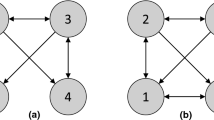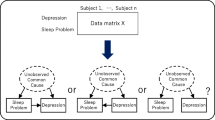Abstract
Because causal learning from observational data cannot avoid the inherent indistinguishability for causal structures that have the same Markov properties, this paper discusses causal structure learning within a Markov equivalence class. We present that the additional causal information about a given variable and its adjacent variables, such as knowledge from experts or data from randomization experiments, can refine the Markov equivalence class into some smaller constrained equivalent subclasses, and each of which can be represented by a chain graph. Those sequential characterizations of subclasses provide an approach for learning causal structures. According to the approach, an iterative partition of the equivalent class can be made with data from randomization experiments until the exact causal structure is identified.
Preview
Unable to display preview. Download preview PDF.
Similar content being viewed by others
References
Andersson, S.A., Madigan, D., Perlman, M.D.: A characterization of Markov equivalance classes for acyclic digraphs. Annals of Statistics 25, 505–541 (1998)
Cooper, G.F., Yoo, C.: Causal discovery from a mixture of experimental and observational data. In: Uncertainty in artificial intelligence: proceedings of the fifteenth conference (1999)
Friedman, N.: Inferring cellular networks using probabilistic graphical models. Science 303(5659), 799–805 (2004)
Heckerman, D., Geiger, D., Chickering, D.M.: Learning Bayesian networks: The Combination of knowledge and statistical data. Machine Learning 20, 197–243 (1995)
Jansen, R., Yu, H.Y., Greenbaum, D.: A Bayesian networks approach for predicting protein-protein interactions from genomic data. Science 302(5644), 449–453 (2003)
Pearl, J.: Probabilistic Reasoning in Intelligent Systems. Morgan Kaufmann, San Francisco (1988)
Pearl, J.: Causality: Models, Reasoning, and Inference. Cambridge University Press, Cambridge (2000)
Spirtes, P., Glymour, C., Scheines, R.: Causation, Prediction, and Search. Springer, New York (1993)
Tian, J., Pearl, J.: Causal Discovery from Changes. In: Proceedings of the Conference on Uncertainty in Artificial Intelligence, UAI (2001)
Tian, J., Pearl, J.: Causal Discovery from Changes: a Bayesian Approach, UCLA Cognitive Systems Laboratory, Technical Report (R-285) (February 2001)
Volf, M., Studeny, M.: A graphical characterization of the largest chain graphs. International Journal of Approximate Reasoning 20, 209–236 (1999)
Verma, T., Pearl, J.: Equivalence and synthesis of causal models. In: Uncertainty in artificial intelligence: proceedings of the sixth conference, pp. 220–227 (1990)
Author information
Authors and Affiliations
Editor information
Editors and Affiliations
Rights and permissions
Copyright information
© 2005 Springer-Verlag Berlin Heidelberg
About this paper
Cite this paper
He, YB., Geng, Z., Liang, X. (2005). Learning Causal Structures Based on Markov Equivalence Class. In: Jain, S., Simon, H.U., Tomita, E. (eds) Algorithmic Learning Theory. ALT 2005. Lecture Notes in Computer Science(), vol 3734. Springer, Berlin, Heidelberg. https://doi.org/10.1007/11564089_9
Download citation
DOI: https://doi.org/10.1007/11564089_9
Publisher Name: Springer, Berlin, Heidelberg
Print ISBN: 978-3-540-29242-5
Online ISBN: 978-3-540-31696-1
eBook Packages: Computer ScienceComputer Science (R0)




